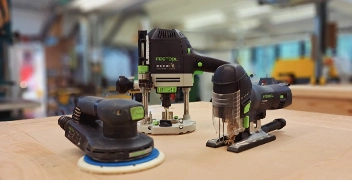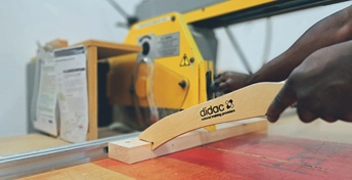Wood Machinist
Apprenticeship Level 2
| Occupations | |
|---|---|
| Wood Machinist | ✔ |
| Machinist / Assembler / Finisher | ✔ |
| Timber Processing Technician | ✔ |
| Furniture Maker | ✔ |
| Level | |
|---|---|
| Level 2 - equivalent to GCSE | ✔ |
| Essential workplace skills | ✔ |
| Vocational skills | ✔ |
| Training Locations | |
|---|---|
| Employer's manufacturing facility | ✔ |
| Woodwise Academy, Bristol | Block Release |
| Getting started | |
|---|---|
| January, May & September | Starts |
| Training places subject to caseload capacity | Please enquire |
| Geographic locations - some restrictions apply | Please enquire |
| Training Access & Support | |
|---|---|
| Access Didac's eLearning Portal | ✔ |
| One-to-one training sessions | ✔ |
| Regular reviews with your trainer and employer | ✔ |
| ePortfolio - to record training & development | ✔ |
| Opportunities to improve your maths & English skills | ✔ |
| Duration | |
|---|---|
| Minimum of 12 months, typically 15 to 18 months | ✔ |
| Funding - England | |
|---|---|
| Government Funding | ✔ |
| Funding Value | £9,000 |
| Employer Contributions | £1, 000 |
| Age grants for employers - England | |
|---|---|
| Under 19 Apprentice - 3 months | £500 |
| Under 19 Apprentice - 12 months | £500 |
| Apprenticeship Standard | |
|---|---|
| General Furniture Manufacturer - see page 18 | |
| Wales, Scotland & Northern Ireland | |
|---|---|
| Please contact us for commercial options | |
Wood Machinist
Apprenticeship Level 2
Wood machinists are skilled craftsmen/women who produce components using a wide range of machinery
Furniture, Joinery, Construction, Shop-Fitting, Fitted Furniture
Skilled wood machinists take raw materials and produce components to a given specification to be used in the manufacture of all sorts of products that you see all around us.
Setting up, operating and maintaining wood working machines such as saws, planers, moulders, lathes, routers and CNC machines all feature. But the apprenticeship can also covers other processes such as edge banding where veneers or plastic edging tape for example is applied to panels.
Whether you are leaving school, graduating or looking to change career to work with wood this is a great apprenticeship standard because it provides the knowledge and skills for occupations in the wood processing industries, which are experiencing skills shortages.
For employers, offering structured apprenticeship programmes with career progression on completion will improve your chances of recruiting talent into your business.
There is good evidence the apprentices make loyal, skilled employees who have a positive impact on the whole team.
With Didac’s industrial experience, we can create training plans to cover specialised wood machining situations. In one recent exercise the Didac team mapped the apprenticeship to a highly automated internal door production facility.
Click the Add to Enquiry button below to find out more – it could be the best click you have ever made…
Specification
| Accreditation | |
|---|---|
| Delivery |
The essential knowledge and skills areas are:
Measure and Mark Out – materials to specification within the acceptable tolerances following standard operating procedures
Tooling – Select, prepare and maintain wood machining tooling
Cutting – Prepare, set-up and operating woodworking machinery.
Planing – Prepare, set up and operate planes. This includes surface planer and thicknesser and four sided planer and moulder (for planed all round)
As part of the programme there are optional units in the following areas:
- Calibrating
- Jigs & Templates
- Profiling
- Boring
- Sanding
- Edge banding
- Joints
- Finishing &
- Assembly
The final selection of units will depend on the processes being used in your work place setting.
That will also influence the range and types of materials you will be working on. It could include softwoods, hardwoods, composite panel products such as medium density fibreboard or particle board, engineered panel products or plywood. Facing materials such as veneer or laminate could feature.
In some industries plastics and free cutting metals such as aluminium are also machined using woodworking machinery.
You must:
- be 16 or over
- not already be in full-time education
- live in England to qualify for Didac funded apprenticeships
You can start an apprenticeship whether you’re starting your career, want a change or you’re upskilling in your current job. You can have a previous qualification like a degree and still start an apprenticeship.
As an apprentice you’ll:
- learn and train for a specific job
- get paid and receive holiday leave
- get hands-on experience in a real job
- be given the opportunity to improve your maths and English skills
- study for at least 20% of your working hours off-the-job
- complete assessments during and at the end of your apprenticeship
- be on a career path with lots of future potential
You may also like…

Review Title
Please feel free to leave us a review!



Review Title
Please feel free to leave us a review!


